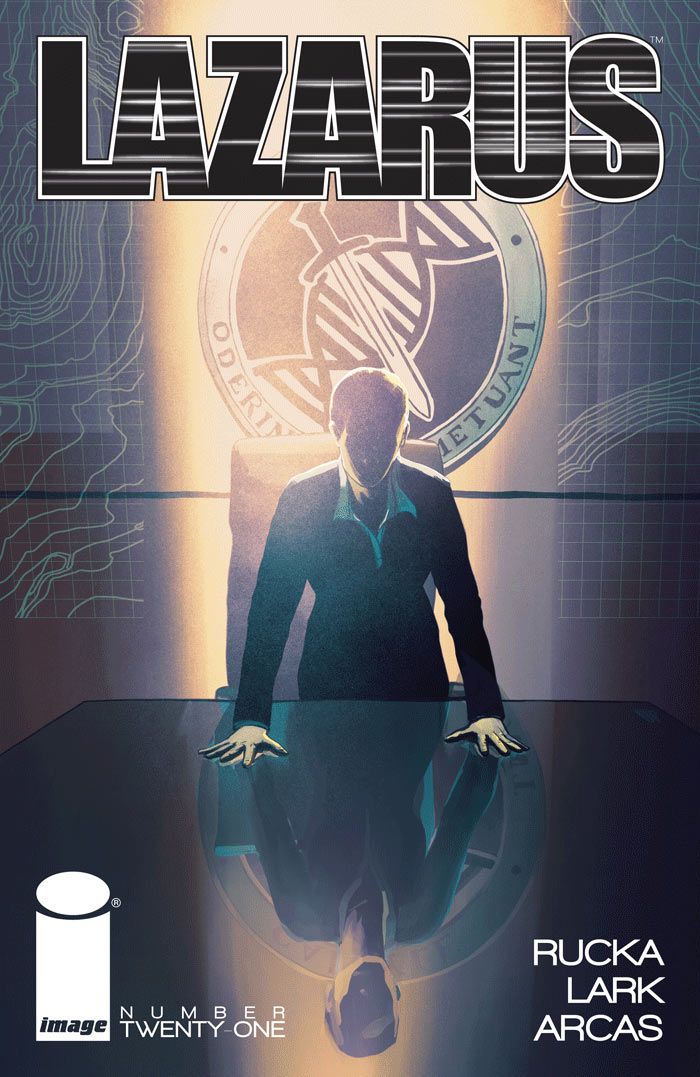Greg Rucka and Michael Lark's "Lazarus" #21 is the big inflection point for the "Poison" story arc and in the war between Carlyle and Hock. The action has been advancing steadily in three settings and among three groups of characters: Johanna and Stephen in Puget Sound; Forever's team in Duluth; and Michael, Beth and James in the Southern Sierra Nevadas. The transitions between all three settings are always clear due to the captions and Lark's pacing, so the story is easy to follow even when the fate of the Carlyle Family is divided in three.
There is some suspense, but few surprises. Rucka's plotting doesn't deviate from classic patterns: the young doctor makes good on his potential, a Reversal of Fortune, David vs. Goliath, etc. However, it's satisfying all the same for the emotional payoff in seeing exactly how these scenarios play out.
Casey and Forever don't exchange many words in Duluth, but their few conversations have shown a mutual regard. In "Lazarus" #21, Forever seems especially open, from her childish eagerness in eating her food to her admission to Casey about a "mistake." Lark's facial expressions are excellent, especially for Forever's momentarily downcast, reflective eyes. Arcas' colors as well as Lark and Boss' shading are especially evocative in this scene, particularly in the loose inks for Forever's hair and the stairs behind her. When the team is retrieved, the position of Forever's body seems to indicate she was shielding Casey and the rest of her team with her body. This bit of purely visual storytelling is moving, and Lark makes it count even more by cinematically by seguing into a close-up of a broken sword. The symbolism is obvious but appropriate.
Michael's breakthrough in the hospital/lab with Beth and James has been building for several issues, and Beth's reaction is the real surprise. Her demeanor is usually so angry, defensive and cold that her joy in success may indicate true family feeling and not just relief at recovering a state of continued security. Rucka's characterization advances quickly along with the plot.
These two settings have momentous developments indeed, but it's the sequence of events in Puget Sound that are the most powerful in this issue. A transfer of power and leadership has been heavily hinted at, if never stated outright, in the earlier issues of the "Poison" story arc. It goes as expected, although Rucka and Lark deserve credit for making the transition subtler and smoother than expected.
This is Johanna's big moment and she rises to the occasion, showing her talents for strategy, reading people, taking control of a room and sheer showmanship. She's been nothing but two-faced and self-interested so far, although there was a previous glimpse of her soft skills when she turned Emma in "Lazarus" #7. Despite her last-second betrayal of Mason, Johanna so ably handles the patriarchs of Morray and Carragher that she makes the reader root for her. One wonders if she'll continue to be spoilt and self-serving, or whether the power she's always craved will improve her instead of further corrupting her.
Rucka and Lark save their biggest plot twist in "Lazarus" #21 for the last scene, and it's a game changer. It was smart of Rucka and Lark to present the scene from Sonja's point-of-view, since her visitor status allows her to share in the reader's shock, though the four-panel reveal is too prolonged and dampens the impact. The twist itself is a staple of science fiction and isn't that surprising, given Carlyle's advanced technology, but I didn't see it coming before this issue. The cliffhanger will leave readers with new questions about where Carlyle will be "sailing next," as Johanna puts it, now that the tide has turned.

